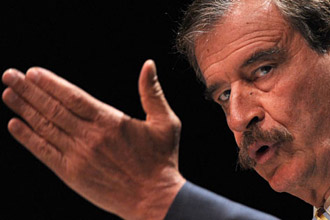
|  |  |  Editorials | Issues | October 2009 Editorials | Issues | October 2009  
Former Mexican President Fox Pans the Current Drug War
 Frontera NorteSur Frontera NorteSur
go to original
October 26, 2009


| | Mexico's former president also had words for the United States, calling on his nation's main trading partner to do a better job of controlling arms trafficking, money laundering and illegal drug consumption. (Daniel A. Anderson) |  |
Continuing his break with the Mexican tradition of former presidents refraining from direct engagement in politics, Vicente Fox has plunged into another controversy: the Calderon administration's drug war.

In blunt remarks made recently in Vienna, Austria, Fox called on President Felipe Calderon to return the Mexican Army to its barracks as soon as possible and leave the enforcement of drug laws to federal police.

"Using the army, using force against force, hasn't solved the problem," Fox told the annual meeting of the conservative European Popular Party. "On the contrary, it has multiplied it."

Mexico's former president also had words for the United States, calling on his nation's main trading partner to do a better job of controlling arms trafficking, money laundering and illegal drug consumption. Nonetheless, Fox questioned drug use prohibition as a realistic strategy.

"Drug consumption is a personal responsibility, not one of government," Fox was quoted as saying. "Perhaps it is impossible to ask government to halt the supply of drugs to our children."

Mexico decriminalized the possession of small amounts of drugs for personal use earlier this year.

Fox's comments in Austria could be in response to criticism from Calderon administration officials and others that drug-tainted violence and corruption spiraled out of control during the former president's term in office, from 2000 to 2006.

Entitled "The Farm," a video song released this year by the musical group Los Tigres del Norte lampooned the Fox years and the explosion of narco-violence. The wildly popular combo performed the song before 35,000 fans at a concert in Monterrey, Nuevo Leon, on Sunday, October 18.

The latest drug addiction survey, sponsored by Mexico's Health Ministry, reported that between 2002 and 2008 cocaine use nearly doubled, from 1.4 percent to 2.5 percent of the population in the 12-65 age group. By 2008, illegal drug use was reported among 5.7 percent of the age group in question, according to the study.

Like all Mexican presidents over the last 40 years, Vicente Fox relied on the armed forces as the leading force against illegal drug trafficking. Significantly, the armed forces also expanded its role in immigration law enforcement and other civilian policing duties during the Fox presidency.

In the Fox years, the Mexican army was deployed in Sonora, Chihuahua, Tamaulipas and other states after narco-related violence began intensifying to unseen levels in 2003. A review of Frontera NorteSur's archives showed that at least 1,395 people were reported killed in homicides linked to organized crime from January 1, 2005 to November 29, 2005.

Another 2,012 people were reported slain in similar circumstances during the same period of time in 2006. In contrast, nearly 2,000 people have been murdered in the narco war in Ciudad Juarez alone so far this year.

A recent edition of the weekly Proceso magazine estimated that about 14,000 people were killed as a result of narco-violence from the time of President Calderon's December 2006 inauguration to mid-August 2009.

"Not since the years before the Revolution and the (1920s) Cristero War has Mexico experienced homicidal violence as it has now," wrote Proceso reporter Jorge Carrasco Araizaga in a story that compared Mexico with Somalia, Haiti, Brazil and Colombia.

In his piece, Carrasco noted the proliferation of paramilitary bands, self-defense groups, armed communities, and private guards of all sorts. Arturo Alvarado, a researcher for The College of Mexico, was cited by Carrasco.

"We are in an era of unprecedented criminal violence," Alvarado said, "produced by delinquent bands as well as by the military and police interventions of the federal government."

Sources: El Universal/EFE, October 17, 2009. La Jornada/Notimex, October 16 and 18, 2009. Lapolaka.com, September 3, 2009. Proceso, August 17, 2009. Article by Jorge Carrasco Araizaga.

Frontera NorteSur (FNS)
Center for Latin American and Border Studies
New Mexico State University
Las Cruces, New Mexico |

 |
|  |



